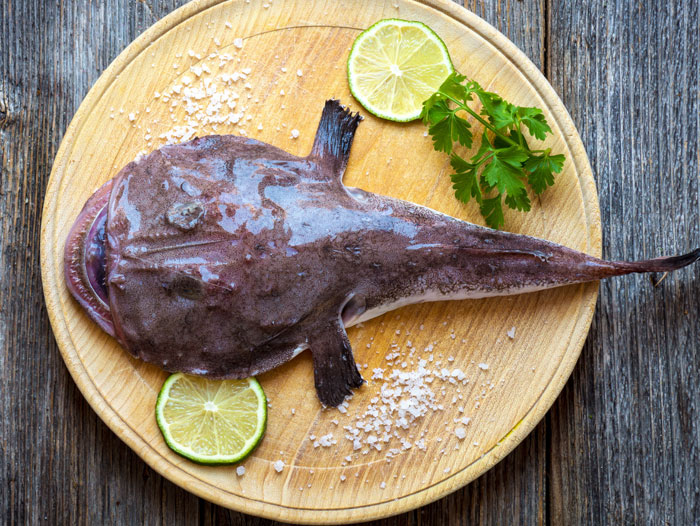The Golden Goose-Fish of the Northeast : A Regional Seafood Promotion Initiative
October 26, 2022 | 2 min to read

Riverhead, NY – Earlier this month, the Fisheries Department of Cornell Cooperative Extension of Suffolk County’s Marine Program began its latest collaboration with the commercial fishing industry, industry organizations, and Food Export-Northeast’s Seafood Program Coordinator Colleen Coyne to increase consumption and demand of local seafood throughout the Northeast region. Funding provided by the Saltonstall-Kennedy Grant Program allows this project to focus on increasing domestic demand for monkfish (aka goosefish) through product development and audience expansion.
Monkfish (Lophius americanus) is a species of bottom fish that inhabits the waters of the Greater Atlantic region and is targeted by commercial fishing fleets from Maine to North Carolina. Monkfish has firm, white, sweet-tasting meat akin to that of lobster. Its flavor has made monkfish a popular substitute for traditional lobster dishes, such as bisques and rolls. Additionally, monkfish is considerably cheaper than lobster, making it an excellent option for those who wish to enjoy the latter and don’t want to break the bank. Monkfish is an excellent candidate for slow cooking recipes, such as stews and chowders, but it’s also great grilled, baked, broiled, or fried.
Weak foreign markets and a lack of domestic demand for Monkfish has resulted in a largely underutilized fishery. As a result, the number of Northeast harvesters landing monkfish has declined in recent years, despite the population exceeding target levels. This new project aims to rejuvenate the Northeast monkfish fishery by increasing public awareness and encouraging consumption of this delicious yet obscure fish.
Currently, this species is above target population levels and highly sustainable, making it an environmentally conscious seafood choice. Furthermore, due to its widespread range throughout the Northeast, monkfish can be targeted by commercial fishermen close to their home port. This eliminates the need for these fishermen to travel up and down the coastline in pursuit of their catch, significantly decreasing fuel consumption and emissions.
Over the next two years, CCE Suffolk will work closely with numerous commercial fishermen and seafood dealers/processors throughout the Greater Atlantic region to develop an effective means of promoting and marketing monkfish. Additionally, CCE Suffolk will engage in public outreach events, such as information booths and local seafood tastings, to both educate and encourage people to become more familiar with eating monkfish. CCE Suffolk will also be holding three workshops throughout the course of this project with partners in both the commercial fishing and seafood industry to capitalize on progress and maintain a solid working relationship throughout the industry.
By the end of this project, CCE and its partners hope to make monkfish a popular and desirable staple of any seafood market or dinner table. Regionwide success in this regard will not only breathe life into a once-lucrative fishery, but also support local fishermen and businesses, reduce the carbon footprint, and reduce commercial fishing pressure on other heavily fished sought-after species. With so many potential benefits attached to monkfish, this may very well be the golden goose that Northeast’s commercial fishery needs.
